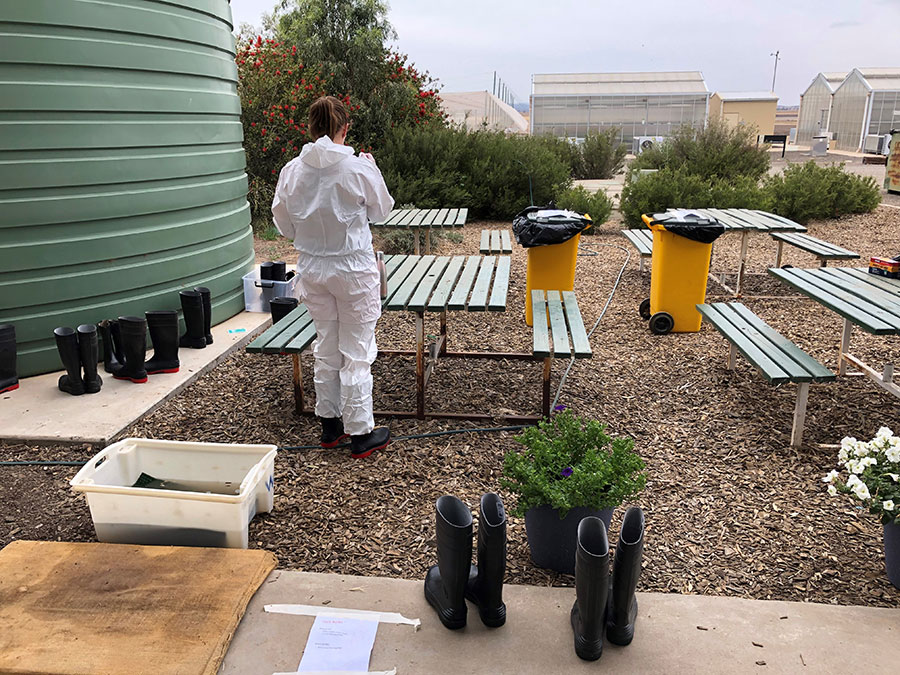Drought, dust storms and bushfires probably best describe the 2019 season, but for the University of Sydney’s Plant Breeding Institute (PBI) at Narrabri, it was also a season when harvest was put on hold for 11 days. The site was effectively locked down following the suspected detection of an emergency plant disease.
Delays on any farm at harvest time are frustrating, but delays on a 2500-hectare property with commercial grain production as well as tens of thousands of plant breeding and research plots ready to harvest can create logistical nightmares and stress for staff.
The delay to harvest was the result of precautionary action taken by the New South Wales Department of Primary Industries (DPI) following the submission of a single diseased head of wheat with an unusual expression of bunt disease symptoms.
Unfortunately, the preliminary diagnosis of the fungal spores in the sample was inconclusive, and the department was not able to rule out the possibility of an exotic disease without conducting further morphological and DNA investigations of the samples.
While waiting for confirmation of the diagnosis, the site was directed not to move plant or soil material on or off the property and not to undertake activities that could potentially spread the disease, such as mechanical harvesting.

Personal protective equipment and footbath were required for field work. Photo: Bill Gordon, NSW DPI
Not moving plant or soil material meant that vehicles and machinery could not be moved off the property unless they were fully decontaminated. People conducting essential field work had to wear personal protective equipment, use footbaths regularly and change their clothing before leaving the site.
While the restrictions were difficult for everyone onsite, PBI staff understood that they were a precaution to protect the entire grains industry.
Implementing the lessons learnt
When the good news arrived that the sample did not contain an exotic disease, harvest recommenced and restrictions to the site were eased. Recognising the potential for a more serious outcome if a different diagnostic result was received, PBI staff wanted to capture the lessons from their experience to minimise future biosecurity risks to the farm.
While many areas for improvement were identified in an action plan developed by the site, two areas that could improve biosecurity on any farm included better control of people movement and enforcing a ‘come clean, go clean’ policy.
Better control of people movement on site included:
- zoning areas of the farm according to biosecurity risk, such as production areas (high-risk), sheds and work areas (medium-risk) and visitor car parks (low-risk), where entry into different zones requires different levels of hygiene and personal protective equipment;
- updating the site visitors’ register to include basic risk assessment questions before entry;
- biosecurity requirements, including onsite inductions and updating of on-farm maps to clearly indicate obligations; and
- specific advice provided to international visitors before arrival and onsite.
Better control of vehicle and machinery movement and hygiene included:
- redesigning traffic flows onsite to restrict access to high-risk production areas unless vehicles are authorised and clean; and
- promoting good hygiene standards for vehicles and machinery entering and leaving the site with a ‘come clean, go clean’ policy, supported by the purchase of a refurbished automated vehicle wash-down system.
The most important steps taken by PBI were to identify the areas where risks existed, to devise a simple plan to address risks and to regularly check their progress against the plan. It is important to recognise that small steps are better than no steps at all.
Two years after the initial biosecurity alert, the team at PBI continue to make progress against their plan. The actions demonstrate to everyone visiting the farm that biosecurity is taken seriously, and visitors are expected to share that responsibility.

























































